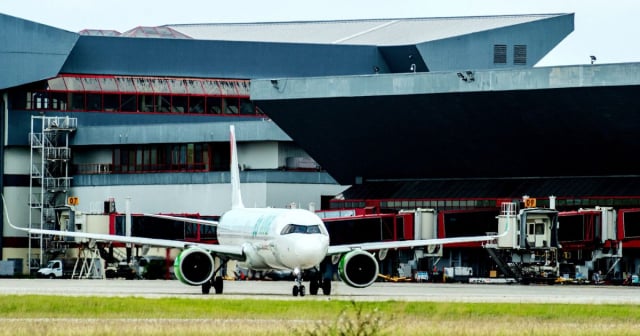Amid the growing energy crisis in Cuba, the country’s airports are facing serious challenges in ensuring operational safety and service continuity. Despite the instability of the National Electric System, José Martí International Airport in Havana has been striving to remain operational.
This airport, the most important in the country, has chosen to use its own backup electrical systems to ensure the functionality of its terminals, especially during the widespread blackouts that affect the island. However, the constant use of these systems, which are supposed to activate only in emergencies, carries a high risk of unexpected failures due to the accelerated wear and tear on the generators and the potential shortage of fuel.
In October 2022, American Airlines suspended five of its six scheduled flights to José Martí International Airport due to the inability to operate normally following power outages. According to the airline, a failure in the passenger check-in technology systems affected its ability to process travelers. This situation resulted in significant congestion with stranded passengers at the terminal in Havana and at Miami International Airport.
In August 2023, another blackout was reported that completely paralyzed José Martí International Airport, rendering the baggage conveyor systems, flight information screens, and passenger check-in points inoperable. Travelers reported a lack of timely communication from the authorities, leading to widespread flight departure delays. The Cuban Company of Airports and Aeronautical Services (ECASA) did not provide immediate explanations, further increasing the sense of uncertainty among passengers.
Recent images of José Martí Airport completely in the dark following a massive power outage highlight the fragility of Cuba's energy backup system. The interruption disrupted flight operations, leaving passengers in uncertainty and sparking criticism on social media, where the effectiveness of the backup electrical systems was questioned. Although the Cuban Aviation Corporation claimed that the backup systems were operational, the images circulated showed the terminal plunged into darkness.
Although authorities claim that the country’s 10 international airports have sufficient energy backup to ensure all services for aircraft, images shared by users on social media reveal a concerning reality. The risk of a failure in the backup system leading to interruptions in runway lighting or communication with the aircraft endangers the operational safety of international flights.
Another noteworthy event occurred on December 4, 2024, when the National Electric System (SEN) experienced a total blackout, impacting all provinces in Cuba, including Havana. On this occasion, José Martí International Airport attempted to maintain its operations using backup generators, successfully ensuring the arrival of 37 international flights, according to authorities.
Cuban airports also face issues related to physical security. The lack of lighting in the access roads leading to the airport terminals has been reported numerous times. Taxi drivers and travelers have reported attempted assaults near José Martí International Airport, particularly during nighttime hours. The inadequate lighting, along with the absence of active surveillance during power outages, jeopardizes the safety of passengers traveling to and from the terminal.
The impact of the energy crisis extends beyond operational issues to encompass the safety of passengers and their property. The lack of electricity affects security controls, such as baggage scanners and metal detectors, which rely on power for their proper functioning. This could create security vulnerabilities, as electronic surveillance, including security cameras, is disrupted during power outages. Additionally, the reduced capacity for access control raises concerns about the potential occurrence of theft and other irregularities within the airport terminals.
In conclusion, power outages at Cuban airports not only disrupt flight operations but also compromise the safety of passengers and the protection of goods. The ongoing reliance on backup systems as the primary power source is not sustainable in the long term, as it leads to accelerated wear on generators and increases the risk of critical failures. Furthermore, the fuel shortage poses an imminent danger, as any disruption in supply would render the airports unable to operate.
Every day of operation under this logic of permanent emergency represents a precarious balancing act, where any failure in the power supply, a malfunction in the generators, or a lack of fuel could lead to a collapse. Cuba is walking a tightrope, betting on operational continuity without addressing the underlying causes: excessive reliance on backup systems, fuel shortages, and the absence of a stable electrical infrastructure. This situation not only compromises the safety of passengers and flight operations, but also raises doubts about international airlines' confidence in Cuba's ability to manage its airports safely and efficiently.
Frequently Asked Questions about the Safety and Operation of Cuban Airports
What is the current security situation at Cuban airports during power outages?
Security at Cuban airports has been compromised due to constant blackouts. The lack of power affects security controls, such as baggage scanners and metal detectors, which rely on electricity for proper operation. This creates security gaps and increases the risk of crimes and accidents.
How does the energy crisis impact the operations of airports in Cuba?
The energy crisis in Cuba severely impacts the operations of airports, especially during widespread blackouts. Backup electrical systems are constantly in use, leading to accelerated wear and tear on generators and increasing the risk of critical failures. This results in flight delays and affects the safety and punctuality of services.
What measures are being taken to ensure the operation of airports during power outages?
To ensure airport operations during outages, backup generators are used. However, the ongoing reliance on these systems is not sustainable in the long term due to wear and potential fuel shortages. The lack of stable electrical infrastructure remains a critical issue.
What is the impact of power outages on the relationship with international airlines?
Blackouts have negatively impacted the relationship with international airlines, as they rely on the operational stability of airports to plan their schedules. The lack of confidence in the capacity of Cuban airports to operate safely and efficiently could lead airlines to reduce or cancel flights, as was the case with American Airlines in 2022.
Filed under:
